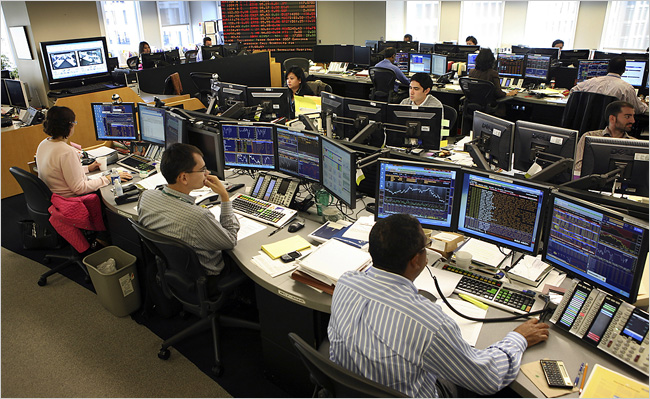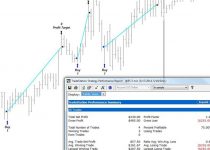Why Canadians Should Use Proprietary Firms For Day Trading
Day trading carries various stipulations and challenges. For instance, a day trader will need:
- 25,000 dollars in margin equity
- Have the challenge of finding low brokerage fees
- Try to get leveraged buying power
- Get fast data feeds and quick software platforms
The largest hurdle is likely getting the 25,000 dollars to be tied up in a trading account. What if an investor merely wanted to try out day trading with a few thousand dollars? Under the current regulations this would be impossible.
Furthermore, the fees charged by discount brokers are excessive when trading dozens or even hundreds of times per day. As well, the brokerage may not give out the rebates that exchanges provide. If a trader adds liquidity to the market (by buying at the bid and selling at the ask), small rebates are given back.
What is a proprietary trading firm or ‘prop shop’, and how can this help Canadian day traders?
Canadian Proprietary Trading Benefits
To professionally buy and sell stock market shares in the United States, a Series 7 ticket is required. This means that before a person from the USA can day trade for a firm they first need to take a securities course and pass it. Not so for Canadians. For some reason the rules are slacker in Canada allowing anyone to professionally day trade with nothing more than their drivers license.
What is a proprietary trading firm? A proprietary trading firm allows traders to use company capital to buy and sell stocks. The profits made are shared between the firm and the trader.
What are the benefits of trading for a firm as opposed to retail which means trading exclusively for oneself?
- Low Transaction Fees. While an investor may have to pay seven, fifteen, or even twenty dollars per transaction, a trader working for a ‘prop shop’ might only pay fifteen or twenty cents for the same trade.
- Rebates. Most retail discount brokerages do not provide liquidity rebates. At a proprietary trading firm they should pass along the exchange credits. Many traders can buy and sell stock at the same price while racking up large profits with rebate trading. The trader is making money for each transaction made.
- Buying Power. The day trader will have access to the company’s capital. While the company may want to have a security deposit of a few thousand dollars, they will often give 10 or 20 to 1 buying power. This means that a deposit of 5 thousand dollars could give the power of 100,000 dollars per trade.
- Day Trading Rules May Not Apply. While retail day traders might need 25,000 dollars in margin, the proprietary trader does not. Certain other rules that require extra margin may also not apply.
- Platforms and Data Feeds. Proprietary firms will gravitate towards a certain platform or software for trading. Some will give a few choices. The data feeds are generally lightning quick whereas discount brokerages might be slightly delayed. Most proprietary firms trade directly in the market while many retail brokerages require trading through a market maker.
Picking a Proprietary Firm in Canada
Proprietary firms do exist all around the world. Many of them reside in the United States. This article will highlight examples based in Canada although each trader is welcome to examine the options. This is a list of over 200 different proprietary trading firms around the world.

What should a good firm offer?
- Cheap transaction fees are a must. Prop shops should be making their money from profit sharing with good traders, not scalping their own employees on transaction pricing. If prices are high, rebate trading is all but impossible.
- Remote trading is a perk. If a trader can casually trade from his home this allows for freedom to live virtually anywhere and day trade.
- Buying power is somewhat touchy. The better the trader the more buying power he will get. 10 to 1 is good to start with.
- Full rebates should be passed onto the trader.
- What about profit sharing? Some firms offer 100 percent payouts meaning whatever the trader makes as profit he keeps. Usually such high payouts come at the expense of hidden costs for transactions or ‘training’. Payouts over 60 percent are good to start with.
- The minimum deposit should only be a few thousand dollars. Be on the watch for monthly fees for software and data feeds that are excessive.
Reviewing a Montreal Based Prop Shop
Golden Market Trading is one such firm that allows for remote trading.
Payout Structure (monthly basis)
- 0-9999$ : 70%
- 10k+ : 75%
Fees and Commissions
- Commissions are 0.20 per 1000 shares (0.0002 / share).
- Monthly fees for Sterling platform and all quotes and data: 200$
- ECNs are 100% passed through.
- Markets available: NYSE – NASDAQ – AMEX
Deposit / Buying power / Stop limit
- The minimum deposit is 2000$ USD.
- Buying power is allocated according to a trader’s experience and needs.
- Daily stop limit is set at 10-20% of deposit amount (can be adjusted going forward).
Day Trading For a Living
Whether or not one chooses to day trade for a living is completely up to them. They should know that the risks and stress of such a job can be quite high. Only very disciplined people that have quick video-game reflexes and enjoy puzzles should engage in such a venture. If such a job appeals to a someone, many options are available in the form of proprietary trading firms in the United States and Canada.






